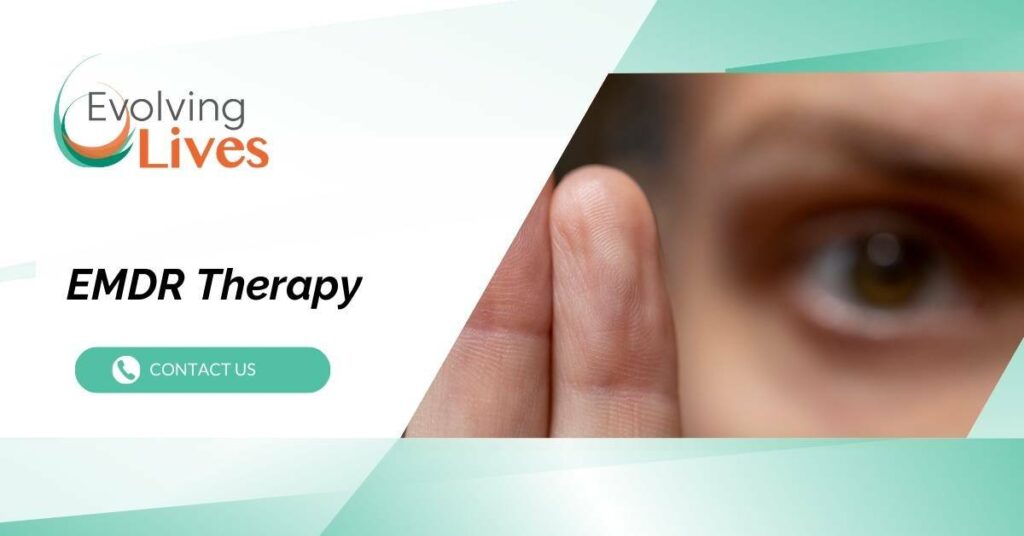EMDR Therapy
Transformational & Nurturing Healing With EMDR Therapy
If you’ve lived through a traumatic experience, there is light at the end of the tunnel, thanks to EMDR therapy. EMDR offers deeper change by addressing the root cause of trauma within your nervous system, and over 40 years has shown proven benefits for treating post-traumatic stress disorder, anxiety, panic, and other mental health conditions. If you’ve felt stuck, unable to heal, EMDR could be the life-changing solution you’ve been looking for.
If you’ve tried talk therapy, cognitive behavioral therapy, or medication only to end up with disappointing results or negative side effects, EMDR could be a great fit for you. It’s tailored to address the biology of your issue, instead of just talking about things or re-traumatizing yourself feeling stuck in your past. The proven, evidenced-based technique EMDR can release you from your suffering.

What Is EMDR Therapy?
EMDR is short for “eye movement desensitization and processing.” EMDR cognitive processing therapy is fairly new, with the first clinical trial appearing in 1989.
Normally, you recognize that memories have happened in the past. But after trauma, your brain might not recognize that the danger is over. So, when you remember the traumatic event, it can feel like you’re living it all over again. Think of it as a constant “fight or flight” response.
EMDR aims to correct this response and help you put upsetting memories in the past where they belong. That’s why this mental health intervention is so helpful for PTSD, stress reduction, and anxiety relief.
The Efficacy of EMDR Therapy: Does It Work?
If you’ve heard of EMDR, you may have been reluctant to try it because it sounds like science fiction. The good news is that the benefits of EMDR are real and backed by decades of research.
Over 26 clinical studies have shown EMDR’s effectiveness, with many studies showing the EMDR is more effective than traditional trauma-focused cognitive behavioral therapy. In other words, this innovation is real, and it works. Other studies have noted a rapid decrease in negative emotions and the vividness of disturbing images.
Science suggests that EMDR isn’t just helpful for PTSD. Studies have proven EMDR to be effective in areas besides trauma, including anxiety, depression, grief, chronic pain, addiction, and other common mental health challenges. It’s safe, and effective, when working with a trained EMDR practitioner.
EMDR may not yield the same results in everyone, but it’s a promising treatment for those who would rather avoid talk therapy or medication.
The Journey Through EMDR: A Step-by-Step Process
Online EMDR therapy involves the following eight-step process:
- First, you’ll complete a questionnaire to help us get to know you better. This enables us to understand your past and present and where you want to be.
- Next, we’ll introduce some exercises and tools to help your nervous system stay regulated. We can use these tools to “ground” you and help you shift your focus back to the present.
- Then, we’ll talk about disturbing events you’d like to process. We’ll discuss the memories, emotions, and bodily sensations associated with each event.
- In this stage, we proceed with bilateral stimulation, which involves following a light bar or finger back and forth.
- When the memory is no longer triggering, we proceed with strengthening positive beliefs.
- We’ll ask you to scan your body and note whether you feel lingering disturbances.
- If we haven’t achieved full processing in one session, we’ll contain the memory for next time.
- At the beginning of a new session, we’ll evaluate how well the EMDR has worked.
How Do You Feel After EMDR Therapy?
No two people are the same, but many clients report feeling “lighter” after EMDR, as if a weight has been lifted off their shoulders. You may feel less anxious and fearful overall. Once treatment is complete, you might find that previously traumatic memories no longer bother you as much as they used to. At last, you can face the world with your head held high.
We provide a warm, caring space where you can heal without judgment or worry. Our EMDR providers will compassionately walk with you on the road to recovery. With us in your corner, you can beat PTSD and take your life back from traumatic memories.

Matthew Swartz, MSSW, LMSW

Sarah Swartz, MA, LPC
Embrace Transformation With Evolving Lives
Evolving Lives provides confidential online EMDR throughout Michigan. When you work with us, there’s no need to leave the comfort of home to get the care you deserve. We’ve successfully treated many clients with EMDR and look forward to doing the same for you.
EMDR is an excellent alternative to medication and other trauma recovery therapies. To get started with EMDR therapy, contact Evolving Lives at (248) 880-2554.
Frequently Asked Questions
Is EMDR Right for Me?
EMDR has proven helpful for adults and children with a wide range of challenges. In order to determine if EMDR is right for you, therapists at Evolving Lives will conduct a comprehensive clinical assessment. This involves an intake session with our therapists to discuss your mental health history, trauma or past challenges, and your goals. After this assessment, we can determine if EMDR is appropriate for you.
How Long Will EMDR Take?
How long EMDR takes is dependent on the person and challenge they are looking to address. Single incident traumas, like a car accident, often only take a few sessions (research shows these traumas are often resolved in 6-8 sessions). However, in most cases, the challenges presented are much more complex, and take months or years to resolve in the same way as standard therapy.
What Results will I see?
EMDR results are different for different people, different challenges or diagnoses, and different goals. In general, you will see reduced distress around past difficult or traumatic memories you chose to process first and foremost. You will also be able to change negative beliefs about yourself tied to those events. In most cases, symptoms in the present day that are impacted by those events will decrease, like anxiety, depression, anger, negative habits and addictions, relationship challenges, and more. You will also see an increase in positive impacts like greater joy and other positive emotions, improved relationships and feelings of connection, increase in feelings of peace and calm, increase in self-esteem and self-worth, increase in ability to build positive habits, and other positive outcomes.
How Exactly Does EMDR Work?
EMDR works by helping the brain to work through and process negative past experiences and emotions that have left emotional injuries in the brain and nervous system. When we experience a negative, distressing, or traumatic event, our brain often goes into “fight or flight” to protect us, but this can also interrupt our brain’s ability to process the event. EMDR works by helping to engage parts of the brain like the amygdala, hippocampus, and prefrontal cortex in re-processing the memories. This leads to the brain being able to return to naturally healing and decreases negative symptoms.
